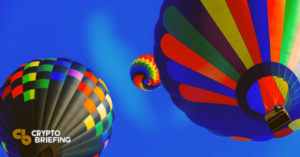The application of immersive technology into the attractions and amusement landscape is covered by industry specialist Kevin Williams. In his latest Virtual Arena column – we visit the test project for a new kind of Immersive Theater – employing the latest technology, including Magic Leap AR headsets, making its debut in live performance.

The diversity of location-based experiences is constantly growing, we have already covered in this column some of the related immersive presentations in the arts. And recently the team behind a new project invited the media to be the first to be immersed in a new audience experience. Called Lost Origin Experience – the endeavour has been self-styled as a boundary-breaking piece, combing performance, mixed reality to offer an “Immersive Theatre”. A fusing of technologies, including a partnership with Magic Leap to deploy their headsets as part of the performance. Allowing the audience to interact with both the physical and digital worlds.
The experience was developed by studio Factory 42, presented in partnership with the Almeida Theater and Sky. The work is a UK government-funded research and development project, part of the Innovate UK to push boundaries in immersive experiences (the Industrial Strategy Challenge Fund’s Audience of the Future initiative). Along with the whole unique aspect of this immersive theatre, is the careful attention to detail cemented using the full gambit of mixed reality (MR) applications. This is stated as being the first-ever large-scale visitor experience deployed with Magic Leap headsets. The whole project is a limited-time test run of the concept, being operational only for a one-month window, in London.
Having booked a slot, the theatre experience sees the guest recruited as a member of the organization called “Wing 7”, planning to carry out an investigation, codenamed “Operation Origin” – directed to arrive at the field base at Hoxton Docks, in London. The experience starts before arriving at the secret venue, as guests receive a mysterious video emailed to them before they arrive setting the scene, from the operations director. Upon arrival at the field base, the guest is taken into a briefing and introduced to the team and key players. Actors set the scene of a story of dark-web auctions, and secret activities unfold, and then it’s time to enter the adjoining premises and start the search for clues, and more!

Without going into too much detail and revealing the compelling storyline and experience, we can reveal that the adventure takes the group through several rooms’ settings, though the experience is fundamentally broken into four key acts but is much more nuanced. The first offers an immersive puzzle section, then we move into an area of wonder and mystery, then a chance to wear the Magic Leap AR headsets and interact with the environment. And then finally the denouement, where the group get to decide the outcome.
As stated, Lost Origin Experience has played with all the toys in the toybox of immersive experiences. Essentially, we have at the front the use of LARP’ing. Live-action role-playing (LARP) has grown in popularity since the early murder mystery experiences, and more recently with the Secret Cinema kind of events. As we reported in our coverage of ‘The War of the Worlds’ VR experience, the use of theatrical production to drive the audience immersion and steer them through the narrative has grown in popularity combined with immersive entertainment. The Lost Origin offers a great cast, who worked hard to drive the experience for all the guests.

Regarding the other elements, the surprising use of projection-mapping was cleverly and subtly achieved, with guests solving the puzzles and then being transported into a dream-like state. Alongside the projection mapping, the use of motion tracking allows the small audience to drive the story interacting with the narrative being revealed. The cast was ably supported by the live performances, masterfully steering the guests.
But it was the use of AR in this first of its kind immersive theatre performance that was the main area of interest. The developers had elected to use the Magic Leap One Creator Edition headsets for the performance. The group of guests on the third act of the experience are helped to put on the systems, and then navigate around a unique location, and given glimpses of spirits and even transported back in time. The Magic Leap systems were able to offer a competent AR representation, though they were limited by their performance, and it was not a seamless experience. But the developers of the AR app had managed to squeeze as much as they could out of the hardware, and it did work with the narrative presented.

For Magic Leap, the company has pivoted from consumer-facing towards wholly commercial (enterprise) development. Having even announced their plans for a Magic Leap Two, a new interpretation of their headset, with redesigned elements, for some time in 2022. The company has had their original hardware deployed in other pop-up attractions, most notably the deployment in AT&T flagship stores in America, running an experience based on HBO’s ‘Game of Thrones’ universe. Following troubling financial conditions for Magic Leap, and the exodus of senior management, a new CEO has repositioned the company, and secured new investment, to hopefully allow them to grow once again. The team behind Lost Origin worked with Magic Leap as far back as 2018, at the time as one of the only systems able to acquire for the research project.
Regarding the use of AR in such “Immersive Theater” and “Artainment” – several developers have attempted to harness this technology to that end. The most ambitious of these and one of the first mainstream applications was in ‘The Unreal Garden’, which launched as part of the ill-fated Onedome facility in 2018. Employing Microsoft HoloLens AR hardware. The experience proved so compelling that it has been re-launched now as a standalone experience. ‘The Unreal Garden 2.0’ has opened in San Francisco, continuing to expand the use of physical elements and digital illusion – with updated hardware (using the HoloLens 2) and new content.
Returning to London, and Lost Origin Experience – in conclusion, this was a great example of the development in immersive performance, and the strength in bringing strangers together to experience a narrative. A mixture of immersive escape room, with mixed reality experience and live-action performance – the whole thing lasted over 60-minutes and did not drag, seamlessly orchestrated. The experience will only be open for a short period, from 21st November till the 4th December, and will cost £30.00 (and £18.00 for 14–16-year-olds) all bookings online.
This latest example of Immersive Theater offered a glimpse of how tech can play its part in the grand illusion, and we look forward to seeing this kind of application evolve and grow.
Source: https://www.vrfocus.com/2021/11/the-virtual-arena-immersive-theater-breaks-new-ground/
- "
- activities
- Adventure
- All
- Allowing
- america
- app
- Application
- applications
- AR
- AREA
- around
- Arts
- AT&T
- audience
- Briefing
- ceo
- challenge
- Cinema
- Column
- commercial
- company
- content
- creator
- credit
- detail
- developers
- Development
- DID
- digital
- Director
- Diversity
- Early
- Enterprise
- Entertainment
- Environment
- events
- Exodus
- Expand
- experience
- Experiences
- Facility
- factory
- Finally
- financial
- First
- Forward
- Francisco
- full
- future
- great
- Group
- Grow
- Growing
- Guest
- Hardware
- Headset
- HoloLens
- How
- HTTPS
- image
- immersive
- immersive entertainment
- Immersive Technology
- Including
- industrial
- industry
- Initiative
- interest
- investigation
- investment
- IT
- Key
- latest
- Limited
- location
- London
- Magic Leap
- Mainstream
- Making
- management
- Media
- Microsoft
- mixed
- mixed reality
- move
- offer
- Offers
- open
- Operations
- organization
- Other
- Partnership
- performance
- physical
- planning
- Play
- Production
- project
- puzzle
- Reality
- research
- research and development
- Revealed
- Role-Playing
- Run
- running
- San
- San Francisco
- seamless
- Search
- sees
- set
- setting
- Short
- small
- So
- start
- State
- stores
- Strategy
- Supported
- Systems
- tech
- Technologies
- Technology
- test
- Test run
- The Future
- Theater
- theatre
- time
- Tracking
- transported
- Uk
- Video
- Virtual
- vr
- war
- WHO
- Work




